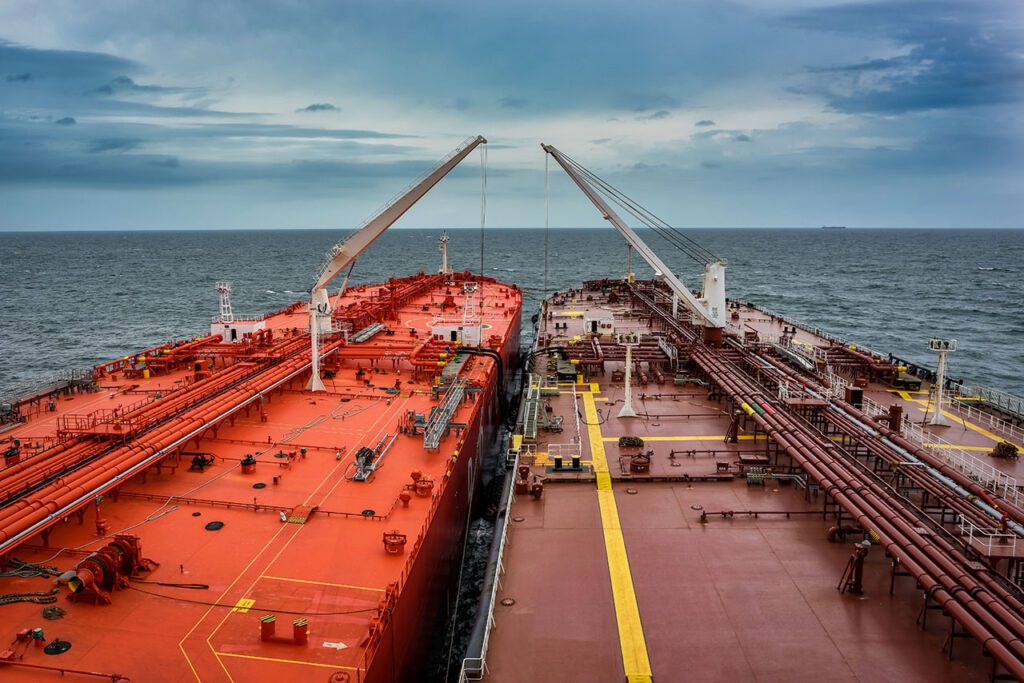Introduction
Ship-to-Ship (STS) cargo transfer operations in both the tanker and dry bulk trades are a common occurrence. Regrettably, it is also common for hull contact damage, crew injury and pollution to occur during STS operations. Careful attention must therefore be paid to charterparty STS terms and the technical challenges of safely securing two vessels alongside each other in what are often unsheltered and rough sea areas. This Risk Bulletin is intended to raise Member awareness of STS risks and provide loss prevention recommendations to minimise costly repairs, crew injury or death, oil pollution liabilities and lost voyage revenue.
Background
As noted above, manoeuvring and securing together two sometimes large ships, keeping them together without hull damage occurring during cargo operations and then safely separating them without incident are tasks which many shipmasters and their crew are not trained to do and may never have experienced. As such, the potential for things to go badly wrong is significant. It is therefore important that everyone involved in an STS operation – both ashore and on board – is made fully aware of the inherent risks and how to minimise those risks.
Regarding shoreside commercial/chartering management/chartering team risk awareness, it is essential that STS risk management starts well before and continues during the charter fixture process. This is to ensure that appropriate charterparty (CP) terms are agreed and confirmed to protect the shipowner/ Member from STS incident liabilities. Recommendations as to how this should be done are provided under the Charterparty Terms section below, inclusive of reference to the BIMCO STS charterparty clauses.
Regarding shoreside technical/ship management team and ship master/crew risk awareness, STS risk management must be planned and implemented well before and throughout the entire STS process. Recommendations on how this should be done are provided the Technical section below, inclusive of references to MARPOL STS regulations and IMO and ICS/OCIMF STS Guidelines.
Charterparty STS Loss Prevention Terms
A CP may either be for the loading of a cargo at a named port and STS discharge to another vessel or for STS loading from another vessel and transport of the cargo to a named port. The type of CP may be Time, Voyage or a variation, such as a Trip/Time CP. The recommendations made below should therefore be followed as appropriate to the CP type and associated circumstances.
- Whether loading or discharging, it is important that the CP terms incorporate the appropriate BIMCO STS Clause being either:
BIMCO STS Clause for Time CPs 2008 – which, for both Tanker and Dry Bulk CPs, provides (in summary only):- Charterers are entitled to order STS operations, all at Charterer’s risk, cost, time and expense.
- Charterers shall direct the vessel to a safe place and area and provide adequate fendering, securing, mooring, etc., all to the approval and satisfaction of the master.
NOTE: The Charterers may meet their fendering and mooring obligations by engaging an STS equipment and services company, inclusive of the attendance of a Mooring Master. Under no circumstances should the Member’s master sign any Letter of Indemnity (LOI) which provides the Member’s direct indemnity to the service provider and/or any similar LOI presented by the other vessel’s master. - If the Owner’s master considers the STS operations may become unsafe, he may suspend operations and order the other vessel away.
- If Owners need to extend insurance cover for STS operations, the additional expense is to Charterer’s account.
- Charterers will indemnify owners for all damage and losses arising out of the STS operations.
BIMCO STS Clause for Dry Bulk Voyage CPs 2015 – which is designed for Dry Bulk Carriers engaged on Voyage CPs and provides (in summary):- Charterers are entitled to order STS operations, all at Charterer’s risk, cost, time and expense.
- Charterers shall direct the vessel to a safe place, anchorage or berth for the STS and provide adequate fendering, securing, mooring, etc., all to the approval and satisfaction of the master.
- Charterers shall obtain all relevant permissions from proper authorities to perform Ship-to-Ship Operations.
- If STS is carried out at a place or anchorage this will be considered as a berth and Notice of Readiness may be tendered and laytime will count in accordance with the Charter Party.
Further: If the master considers the STS operations may become unsafe, he may suspend operations and order the other vessel away. And: Any stoppages or additional time attributable to Ship-to-Ship Operations shall not be excluded from laytime or time on demurrage. - Charterers will indemnify owners for all damage and losses arising out of the STS operations.
In addition to the appropriate BIMCO STS Clause, the following CP terms are also recommended for CP inclusion as ‘Rider Clauses’:
- If the Member’s ship will be discharging, then the CP should state that bill of lading (BL) issued will state that the member’s liability ends when the cargo reaches the discharging vessel’s deck manifold or crosses its rail.
- If the Member’s ship will be loading, the CP should state that: “All Bills of Lading (BL) issued will state that the shipowner’s liability will not commence until the cargo passes through the loading vessel’s deck manifold or crosses its rail”.
- Whether loading or discharging, the CP should state that: “All BLs will include a Liberty Clause permitting the cargo to be loaded or discharged by STS transfer” and a Deviation Clause clarification that “The STS operation will not be construed as a Deviation from the contracted voyage.”
- Whether loading or discharging, the CP should state that: “The STS operation will be performed in accordance with an STS Joint Plan of Operation (JPO) as prescribed by the loading/ discharging vessel’s own STS plan and the most recent edition of the OCIMF/ICS ‘Ship to Ship Transfer Guide – Petroleum’ (full details as below).
- Whether loading or discharging, the CP terms should state that: “No contract exists between the shipowner and the owners or operators of the other vessel, and no agreement is made by the shipowner to indemnify or hold harmless the other vessel or its controlling interests.”
Technical STS Loss Prevention Requirements
The IMO regulations and the published IMO and industry ICS/OCIMF guidelines for the conduct of safe STS operations are currently focused on ‘tanker to tanker’ oil cargo transfers and the damage and loss which can be caused by oil cargo spillage, pollution and associated liabilities.
There are of course other costly damage and loss consequences which can be suffered during STS operations, inclusive of hull damage, bunker tank rupture and crew injury or death. These additional types of potential STS losses and liabilities are common to both tanker STS and dry bulk or other cargo STS operations. As such, STS operation loss prevention requirements for all vessels can be considered as being very similar, but with tanker STS operations requiring greater attention to cargo oil spill and pollution risks.
The IMO regulations and the IMO and industry publications which should be referred to and implemented by Members before engaging in STS operations of any type are referred to below.
MARPOL Chap. 8, Annex 1
STS operations involving tanker oil cargo transfers are regulated by IMO Res. MEPC.186(59) as incorporated into MARPOL ,Consolidate Ed. 2022, Annex 1, Chapter 8, Regulations 40, 41 and 42, ‘Prevention of Pollution During Transfer of Oil Cargo Between Oil Tankers at Sea’. A free and helpful explanatory guide is provided by the ‘Safetests’ publication, A Guide to Compliance, Chapter 8 to Marpol and Annex 1.
MARPOL Chap. 8, Annex 1, provides mandatory regulations for all tankers of 150 GT or engaged in oil cargo STS operations. However, these regulations can and should be also considered as providing prudent shipowner guidelines for all other vessels and cargo STS operations. The regulations for tanker STS operations and guidelines for other types of STS operations are summarised below.
- Notifications: STS tanker operations planned within the territorial sea or EEZ of a MARPOL member state should be notified to that state’s maritime authority 48 hours in advance of commencing operations.
- Person in Overall Advisory Control (POAC): A single POAC must be appointed who may be one of the two ship masters involved or an STS Superintendent. The POAC must be STCW qualified and have training and experience in ship handling, spill response techniques, mooring/unmooring operations, tanker loading/unloading and a thorough knowledge of the transfer area and the STS Plan.
- Equipment: Fenders should be constructed to ISO 17357 pneumatic fender standards and capable of withstanding and then subsequently and evenly distributing anticipated berthing energies and forces. Hoses should be specially designed, constructed and maintained in accordance with EN1765, BS 1435 and OCIMF standards.
- Contingency Planning: All parties must confer to conduct risk assessment, implement risk mitigation and plan emergency response procedures.
- Preparation for Operations: All parties must understand and implement the requirements of MARPOL, Chap. 8, Annex 1, the ICS/industry publication, ‘Ship to Ship Transfer Guide – Petroleum’, and any additional guidelines provided by the tanker and cargo owners.
- Joint Plan of Operation: Must be developed based on STS plan information exchanged between the two tankers and must include full details of mooring and unmooring, hose connection and disconnection, cargo quantities, loading sequence, transfer rates, stopping and emergency shut down procedures, oil spill response, etc.
- Records of Compliance: Records of tanker STS operations shall be retained on board for three years and be readily available for inspection by a Party to the MARPOL Convention.
IMO and Industry Published STS Guidelines
There are two further publications available which provide detailed supplementary advice on how MARPOL Annex 1, Chap. 8, should be implemented as either a regulatory requirement for tanker STS operations or as prudent shipowner guidance for dry bulk cargo/other vessel type STS operations. Details are provided below:
- The IMO publication ‘Manual on Oil Pollution – Section I: Prevention’, 2011 Edition, provides a 138 page guide/manual for all ships but with a focus on tanker operations. Chapter 6 (18 pages only) is titled ‘Ship-to-ship transfer of crude oil and petroleum products while underway or at anchor’. Available from the publisher, Witherby, at a cost of GBP 18.00.
- The ICS/OCIMF publication (specifically referred to in the MARPOL regulations and now updated) ‘Ship to Ship Transfer Guide Petroleum, Chemicals and Liquified Gases’, 1st. Ed. 2013. It is a comprehensive 160 page guide which (unlike the IMO Manual) is dedicated entirely to STS operations. Available from the publisher, Witherby at a cost of GBP 275.00.
Conclusion and Takeaway
The engagement of tankers, dry bulk carrier and other vessel types in STS operations all generate high levels of risk in terms of both probability and potential consequence. It is therefore essential for Members to apply a high level of STS loss prevention to minimise these risks. Failure to do so will likely prove costly and may also impact negatively on Member’s insurance cover.
MM’s STS loss prevention recommendations to Members who currently engage in STS operations, or may do so in the future, are summarised below:
Chartering terms factors:
- All CP terms, whether Time or Voyage CP, should include the appropriate BIMCO STS Clause to ensure the protection of the Owner/Member’s interests.
- The CP terms should also include Clauses (as recommended above) which specify the Owner/Member protective content of the BLs issued, agreement that the STS will be conducted in accordance with a joint STS plan and confirmation that no contract exists between the Owner/Member and the other vessel.
Operational and regulatory factors:
- Tanker STS oil cargo operations are regulated by the mandatory provisions of MARPOL, Annex 1, Chapter 8,. Tanker Owner/Members must therefore ensure the full awareness and compliance of both their ship managers and masters by making certain that their tanker ISM Code or NCVS procedures incorporate both the MARPOL STS regulations and a flag state approved STS Plan.
- Members whose vessels are engaged in STS operations other than oil cargo transfer (e.g., dry bulk) are not regulated by MARPOL, Annex 1, Chapter 8,. However, they are exposed to similar STS risks, and they should encourage awareness of these regulations and their ISM Code or NCVS procedures incorporation and application as essential guidance for the safe accomplishment of STS operations for all cargoes, both liquid and dry.
- All Members who engage in STS operations of any kind should consider the purchase of the OCIMF/ICS ‘Ship to Ship Transfer Guide Petroleum, Chemicals and Liquified Gases’ publication. It is a relatively expensive manual, but it appears to provide the most comprehensive STS guide currently available and should be considered as a key STS tool and loss prevention investment.


